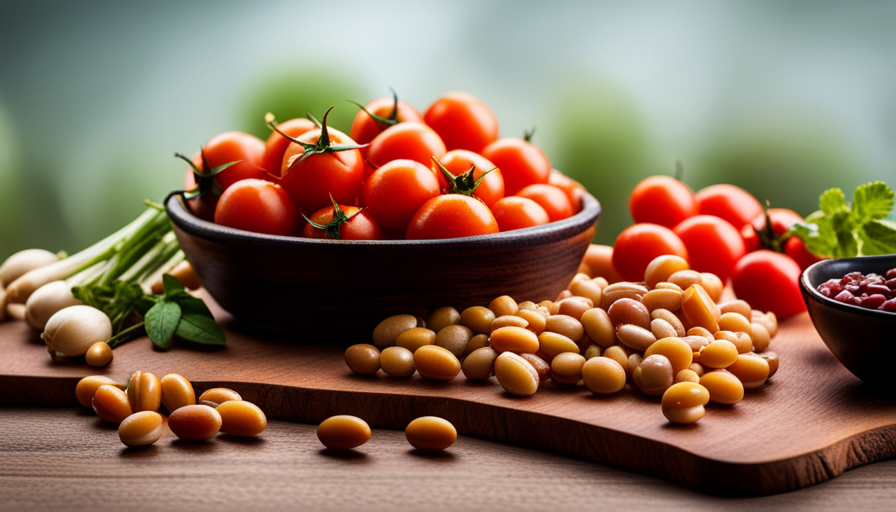Are you finding it difficult to digest raw vegan food? Rest assured, you are not alone. Moving to a raw vegan diet can be tough on your digestion. However, we have some easy and effective tips to assist you in digesting your plant-based meals with ease.
By following these evidence-based techniques, you’ll be able to optimize your digestion and unlock the full benefits of a raw vegan lifestyle. From chewing your food thoroughly to incorporating fermented foods, soaking and sprouting nuts and seeds, and adding digestive enzymes, we’ve got you covered.
We’ll also explore the importance of consuming probiotic-rich foods, avoiding overeating, practicing mindful eating, and seeking professional guidance. So get ready to revolutionize your digestion and embark on a journey of vibrant health and well-being with raw vegan food.
Key Takeaways
- Chew food thoroughly to improve digestion and promote gut health
- Incorporate fermented foods into the diet to improve gut health and increase beneficial bacteria
- Soak and sprout nuts and seeds to improve nutrient absorption and digestive health
- Consider adding digestive enzymes to meals to enhance nutrient absorption and digestive health
Transitioning to a Raw Vegan Diet
Transitioning to a raw vegan diet can be challenging, but with a little planning and a lot of delicious recipes, it’s totally doable! The first challenge you may face is getting used to the idea of eating only raw, plant-based foods. It can be a big change from your usual diet, but remember that it’s a process and not something you have to do all at once.
Start by incorporating more raw fruits and vegetables into your meals and gradually increase the amount over time.
One of the best ways to make the transition easier is by finding raw vegan recipes that you love. There are so many delicious options out there, from salads and smoothies to raw desserts and snacks. Experiment with different flavors and textures to find what you enjoy the most. You can also try incorporating more raw foods into your favorite cooked dishes, like adding fresh veggies to stir-fries or using lettuce wraps instead of tortillas.
It’s important to remember that everyone’s transition to a raw vegan diet is different. Some people may find it easier than others, and that’s okay. The key is to listen to your body and make changes at a pace that feels comfortable for you. Don’t be too hard on yourself if you have setbacks or find it difficult at times. With time and practice, you’ll find what works best for you and discover a whole new world of delicious, nourishing raw vegan foods.
Chewing Your Food Thoroughly
Mastering the art of thorough chewing allows you to savor every bite of your plant-based meals, enhancing the flavor and maximizing the nutritional benefits. But did you know that chewing your food thoroughly can also improve digestion and promote gut health?
When you chew your food well, you break it down into smaller pieces, making it easier for your body to digest and absorb nutrients. This is especially important for a raw vegan diet, as raw foods can be more challenging for the digestive system to break down compared to cooked foods. By chewing your food thoroughly, you give your body a head start in the digestion process, reducing the workload on your stomach and intestines.
Additionally, chewing stimulates the production of saliva, which contains enzymes that help break down carbohydrates and fats. This pre-digestion in the mouth can make it easier for your body to extract nutrients from the food you eat. Moreover, thorough chewing promotes mindful eating, allowing you to fully engage with your meal and avoid overeating.
Improving digestion and promoting gut health are essential for overall well-being. So, the next time you sit down for a raw vegan meal, take your time to chew each bite thoroughly. Your taste buds and your gut will thank you!
Incorporating Fermented Foods
To improve your gut health and boost your overall well-being, try incorporating fermented foods into your diet. Did you know that consuming fermented foods can increase the diversity of beneficial bacteria in your gut by up to 40%? This can lead to improved digestion and nutrient absorption, as well as a strengthened immune system.
Here are four easy fermented food recipes to help you get started:
-
Sauerkraut: This traditional fermented cabbage dish is rich in probiotics, which can promote a healthy gut. Simply shred cabbage, add salt, and let it ferment for a few weeks.
-
Kombucha: This fizzy, fermented tea is packed with beneficial bacteria and antioxidants. You can make it at home by fermenting sweet tea with a kombucha culture.
-
Kimchi: This spicy Korean side dish is made by fermenting cabbage, radishes, and other vegetables with a mix of spices. It’s not only delicious but also a great source of vitamins and minerals.
-
Yogurt: This fermented dairy product is a classic choice for improving gut health. Look for plain, unsweetened yogurt with live cultures or make your own at home using milk and a yogurt starter.
Incorporating these fermented foods into your diet can provide numerous benefits, including improved digestion, increased nutrient absorption, and a stronger immune system. Give them a try and see how they can enhance your overall well-being.
Soaking and Sprouting Nuts and Seeds
When you soak and sprout nuts and seeds, you unlock their full potential for improved nutrient absorption and enhanced digestive health. Soaking techniques involve submerging the nuts or seeds in water for a certain period of time, allowing them to soften and become more easily digestible.
This process also helps to remove any anti-nutrients, such as phytic acid, which can interfere with nutrient absorption in the body.
Soaking nuts and seeds has several benefits. Firstly, it helps to break down the enzyme inhibitors present in the outer layer, making them easier to digest. This can reduce the risk of digestive discomfort and help your body absorb the nutrients more efficiently.
Additionally, soaking can increase the availability of certain nutrients, such as vitamins, minerals, and antioxidants. Soaking also activates enzymes that aid in the digestion process, making it easier for your body to break down and utilize the nutrients.
Sprouting is another technique that can further enhance the nutritional value of nuts and seeds. Sprouting involves allowing the nuts or seeds to germinate by soaking them in water and then allowing them to sprout. This process increases the nutrient content, as sprouts contain higher levels of vitamins, minerals, and enzymes compared to their unsprouted counterparts. Sprouting also helps to neutralize enzyme inhibitors and increase the bioavailability of nutrients.
Incorporating soaking and sprouting techniques into your raw vegan diet can have a significant impact on your digestive health and nutrient absorption. By taking the time to prepare nuts and seeds in this way, you can maximize their nutritional benefits and make them easier for your body to digest and utilize.
Adding Digestive Enzymes
Incorporating digestive enzymes into your routine can greatly enhance the nutrient absorption and overall digestive health of your meals. These enzymes help break down the complex molecules in raw vegan foods, making them easier to digest.
Here are some tips for supplementing naturally and managing portion sizes:
-
Choose a high-quality digestive enzyme supplement that contains a variety of enzymes, such as amylase, lipase, and protease. These enzymes work together to break down carbohydrates, fats, and proteins, respectively.
-
Take the digestive enzyme supplement with your meals to maximize its benefits. Follow the recommended dosage instructions on the label.
-
Consider incorporating fermented foods into your diet, as they naturally contain digestive enzymes. Examples include sauerkraut, kimchi, and miso.
-
Be mindful of your portion sizes. Eating large amounts of raw vegan food can put a strain on your digestive system. Start with smaller portions and gradually increase as your body adjusts.
-
Listen to your body. If you experience any discomfort or bloating after eating raw vegan food, consider reducing your portion sizes or adjusting your enzyme supplementation.
By supplementing naturally and managing portion sizes, you can ensure that your body efficiently digests raw vegan food, allowing you to reap the full benefits of this nutrient-dense diet.
Drinking Plenty of Water
Drinking plenty of water is like quenching the thirst of your body’s inner garden, allowing it to flourish and thrive. When it comes to digesting raw vegan food easily, hydration is key. Water plays a crucial role in the digestion process by breaking down the food you eat and aiding in the absorption of nutrients.
Hydration benefits extend beyond digestion. Water helps maintain the balance of bodily fluids, regulates body temperature, and supports overall organ function. When you stay hydrated, you also promote healthy skin and enhance cognitive function.
To ensure proper hydration, it’s important to follow water intake guidelines. The National Academies of Sciences, Engineering, and Medicine recommend a daily water intake of about 3.7 liters for men and 2.7 liters for women. However, these guidelines may vary depending on factors such as activity level, climate, and overall health.
To make it easier to consume enough water throughout the day, carry a reusable water bottle with you wherever you go. Set reminders to drink water at regular intervals, and make it a habit to sip on water consistently. You can also infuse your water with fruits or herbs to add flavor and make it more enjoyable.
Staying hydrated by drinking plenty of water is essential for digesting raw vegan food easily. Remember to follow water intake guidelines and make drinking water a priority in your daily routine. Your body’s inner garden will thank you for it.
Consuming Probiotic-Rich Foods
To optimize your gut health and support your body’s inner ecosystem, prioritize adding probiotic-rich foods to your daily diet. Probiotics are beneficial bacteria that promote digestion and boost the immune system. They help break down food, absorb nutrients, and maintain a balanced gut flora. Incorporating these foods into your raw vegan diet will aid in the digestion of raw foods and enhance overall well-being.
One way to increase your probiotic intake is by consuming fermented foods. These foods undergo a natural fermentation process that enhances their probiotic content. Some examples of fermented foods include sauerkraut, kimchi, tempeh, and miso. You can easily incorporate these into your meals by adding them as toppings or using them as ingredients in your recipes.
Another option is to include probiotic supplements in your diet. These supplements provide a concentrated dose of beneficial bacteria and can be a convenient way to ensure you’re getting enough probiotics. Look for a high-quality supplement that contains a variety of strains to maximize the benefits.
In addition to fermented foods and supplements, you can also enjoy probiotic-rich beverages. Kombucha, kefir, and coconut water kefir are all excellent choices. These beverages not only provide probiotics but also contain enzymes that aid in digestion.
By incorporating probiotic-rich foods and beverages into your raw vegan diet, you can support your gut health and improve the digestion of raw foods. Experiment with different fermented foods and beverages to find the ones you enjoy the most. Remember to consult with a healthcare professional before starting any new supplements.
Avoiding Overeating
If you’ve been following along, we’ve already discussed the importance of consuming probiotic-rich foods for easier digestion of raw vegan food. Now, let’s move on to another crucial aspect: avoiding overeating.
Portion control plays a significant role in ensuring that you can digest raw vegan food easily. While it may be tempting to indulge in large quantities of fresh fruits, vegetables, and nuts, it’s essential to be mindful of your snacking habits.
One helpful tip is to practice mindful eating. This involves paying attention to your body’s hunger and fullness cues. Before reaching for another handful of nuts or a second serving of fruits, take a moment to assess whether you’re genuinely hungry or simply eating out of habit or boredom.
Another strategy is to divide your meals into smaller, more frequent portions throughout the day. This approach can prevent overeating by keeping your metabolism active and maintaining a steady supply of nutrients for digestion.
Additionally, it’s beneficial to choose nutrient-dense foods that provide satiety and nourishment. Opt for foods high in fiber, protein, and healthy fats, as they tend to keep you fuller for longer.
By incorporating portion control and mindful snacking into your raw vegan lifestyle, you’ll not only support easier digestion but also maintain a balanced and fulfilling diet.
Mindful Eating Practices
Practicing mindful eating is like savoring a piece of rich, dark chocolate – it allows you to truly experience the flavors and textures of your food, making each bite more enjoyable. Mindful eating is a practice that involves paying full attention to the present moment while eating, without judgment or distraction. It can help you digest raw vegan food easily and optimize your overall health.
Here are three mindful eating practices to incorporate into your routine:
-
Mindful meal planning: Take the time to plan your meals ahead of time, considering the nutritional value and variety of the ingredients. This will ensure you have a well-balanced and satisfying meal that supports your digestion.
-
Mindful portion control: Pay attention to your hunger and fullness cues when serving yourself. Use smaller plates and bowls to control portion sizes and take your time to chew your food thoroughly. This will help you avoid overeating and promote better digestion.
-
Slow down and savor: Take the time to appreciate the aroma, taste, and texture of your food. Chew slowly and mindfully, allowing your body to properly break down the food and release digestive enzymes.
By incorporating these mindful eating practices into your daily routine, you can optimize your digestion of raw vegan food and enhance your overall well-being.
Seeking Professional Guidance
Seeking professional guidance can be a transformative step towards optimizing your well-being and finding the support you need on your mindful eating journey. When it comes to digesting raw vegan food easily, a nutritionist can provide valuable recommendations and tips to enhance your digestive health.
A nutritionist can assess your current diet and identify any nutrient deficiencies or imbalances that may be affecting your digestion. They can then provide personalized recommendations on how to optimize your nutrient intake through a raw vegan diet. This may include incorporating specific foods rich in digestive enzymes, such as pineapple or papaya, which can aid in the breakdown of raw plant-based foods.
In addition to nutritionist recommendations, they can also provide digestive health tips that can make a significant difference in your ability to digest raw vegan food. These may include suggestions to chew your food thoroughly, as this helps to break it down and initiate the digestive process. They may also recommend eating smaller, more frequent meals to ease the burden on your digestive system.
Remember, seeking professional guidance can provide you with the knowledge and support you need to navigate the challenges of digesting raw vegan food. By incorporating nutritionist recommendations and implementing digestive health tips, you can optimize your digestion and enhance your overall well-being on your mindful eating journey.
Frequently Asked Questions
Can I still get enough protein on a raw vegan diet?
Yes, you can definitely get enough protein on a raw vegan diet! Let me share a story that’ll illustrate this point. Olympic gold medalist Carl Lewis, known for his incredible athletic performance, adopted a plant-based diet and thrived on it. He credits his success to incorporating sprouts into his raw vegan meals. Sprouts are packed with plant-based protein and other essential nutrients. So, by including sprouts and other plant-based protein alternatives in your diet, you can easily meet your protein needs while enjoying the benefits of a raw vegan lifestyle.
How can I ensure I am getting enough essential nutrients on a raw vegan diet?
To ensure you’re getting enough essential nutrients on a raw vegan diet, it’s important to address potential nutrient deficiencies and plan your meals accordingly. Raw vegan diets can be low in certain nutrients like vitamin B12, iron, calcium, and omega-3 fatty acids. Include plant-based sources of these nutrients, such as fortified foods, leafy greens, legumes, and seeds, in your meals. Consulting with a registered dietitian can also help you create a well-rounded raw vegan diet that meets your nutritional needs.
Are there any potential side effects of transitioning to a raw vegan diet?
Transitioning to a raw vegan diet may have potential health risks for some individuals. To ensure a smooth transition, it’s important to be aware of the potential side effects. These can include digestive issues, nutrient deficiencies, and weight loss. However, by following some tips, you can minimize these risks.
Gradually introduce raw foods into your diet, chew your food thoroughly, and include fermented foods for better digestion. Seek guidance from a healthcare professional to ensure you’re meeting your nutritional needs.
Can I eat cooked food occasionally while following a raw vegan diet?
Yes, you can eat cooked food occasionally while following a raw vegan diet. While raw veganism emphasizes the consumption of uncooked plant-based foods, incorporating cooked food can provide some benefits. Cooking certain foods can actually increase the availability of nutrients and make digestion easier. Cooking also helps to kill any potential pathogens that may be present in raw food. However, it’s important to strike a balance and ensure that the majority of your diet consists of raw, nutrient-rich foods for optimal health benefits.
How long does it usually take to adjust to a raw vegan diet and experience improved digestion?
Adjusting to a raw vegan diet and experiencing improved digestion can vary from person to person, with the time frame typically ranging from a few weeks to a few months. However, there are some tips and tricks that can help speed up the process.
Gradually increasing your intake of raw fruits, vegetables, and sprouted grains can aid in digestion. Chewing your food thoroughly, staying hydrated, and incorporating probiotic-rich foods can also promote a healthy digestive system.
Can Raw Vegan Food Provide Enough Protein for Proper Digestion?
Yes, protein sources in raw food can provide enough protein for proper digestion. Raw vegan options like nuts, seeds, quinoa, and legumes offer quality protein. Combining different plant-based sources can ensure a balanced intake of essential amino acids, supporting a healthy digestive system.
Conclusion
In conclusion, by implementing these simple strategies, you’ll be well on your way to effortlessly digesting raw vegan food. Remember to mindfully chew your food and incorporate fermented foods for a healthy gut. Also, soak and sprout nuts and seeds for easier digestion. Adding digestive enzymes and probiotic-rich foods can also aid in the digestion process. Lastly, be mindful of your portion sizes and seek professional guidance if needed.
With these tips, you’ll be able to navigate the raw vegan lifestyle with ease and enjoy the benefits it brings.










